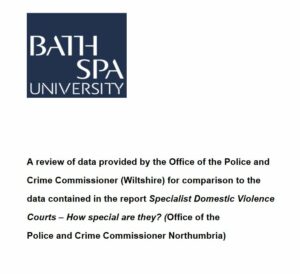The Wiltshire Report Recommendations:
- Recommendation 1
Training from magistrates, court staff and the CPS to be increased in order to enhance their understanding of domestic abuse and SDVC guidelines, attention should be drawn to coercive control.
- Recommendation 2
All aspects of domestic abuse hearings, trials and sentences should be conducted in the SDVC to ensure that a consistent approach is adopted across the criminal justice system. SDVCs should consist of specialists who have received training with regard to domestic abuse cases so that evidence can be properly considered and the right support is provided for victims.
- Recommendation 3
Ensure that IDVAs are always present in court. This should be easy to implement if domestic abuse cases are conducted in the SDC on specific days as per recommendation 2.
- Recommendation 4
The police should endeavour to complete and return victim personal statements in every case as standard practise. The VPS should be made available to the court and should be considered in every case where given.
- Recommendation 5
Agencies should ensure that victims are aware of the special measures that they can access in order to encourage quote attendance to give the best possible ever best evidence possible.
- Recommendation 6
Sentencing guidelines should be followed at all times, hearing domestic abuse cases within the SDVC would make this much simpler to achieve.
- Recommendation 7
Consultation with victims regarding restraining orders must be completed.
The England-wide Report Recommendations in Full:
- Recommendation 1
Police and Crime Commissioners (PCCs) and criminal justice partners to work with specialist agencies to review the availability of Independent Domestic Abuse Advisors (IDVAs) to ensure that they are present in person or by video link at all SDAC court hearings.
- Recommendation 2
Criminal justice partners to assess and make recommendations on how technology can be used to enable the virtual presence in Court and where appropriate, the virtual participation of victims, IDVAs and other relevant personnel. Criminal justice partners to make recommendations on how a good understanding of technology facilitated abuse can be developed in all Court personnel.
- Recommendation 3
Training on dealing with domestic abuse cases is now part of the essential training for all Magistrates, Judges and Crown Prosecutors. Given some of the comments from Magistrates and Judges which were recorded by observers, it seems that consideration needs to be given as to how the effective implementation of this training is ensured in the court setting.
- Recommendation 4
Criminal justice partners to work together to review the format, function, and services provided by Specialist Domestic Abuse Courts (SDACs) and to ensure that all courts adopt the good practice already exemplified in some areas. Government data on the availability and components of SDACs should be made available to support this process.
- Recommendation 5
Criminal justice partners to work with police and develop an effective training programme, supervision and monitoring framework for Domestic Violence Protection Notices (DVPNs) and Domestic Violence Protection Orders (DVPOs). Ensure resources are available so that perpetrators who are in breach of orders are promptly brought to court.
- Recommendation 6
Criminal justice partners and police to instigate a review of the Victim Personal Statement (VPS) process from first contact with the police to finalising a case and provide an analysis of the strengths and deficiencies in the system with recommendations for improvement.
- Recommendation 7
Criminal justice partners and HMCTS and partners to ensure that victims are fully informed about their options regarding special measures, and to review court facilities to ensure the safety and security of victims and witnesses including separate entrances and access to private areas for victims, good sound systems in courts, and appropriate evacuation plans.


